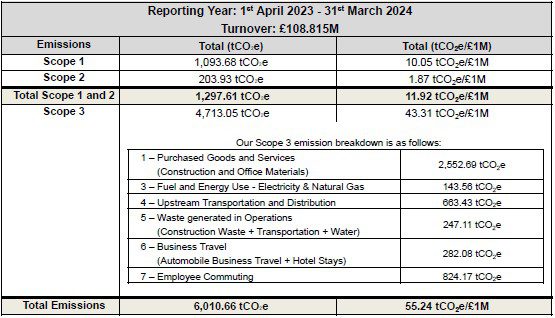Issue Date 10.10.2024 Rev 007
Commitment to Achieving Net Zero
Stepnell Ltd is committed to achieving Net Zero emissions by 2050.
We have set targets to achieve Net Zero for Scope 1 and 2 by 2039 and to achieve Net Zero across our value chain carbon (Scope 3) by 2050.
Baseline Emissions Footprint
Baseline emissions are a record of the greenhouse gases that have been produced in the past and were produced prior to the introduction of any strategies to reduce emissions. Baseline emissions are the reference point against which emissions reduction can be measured. The data is obtained from the Streamlined Energy & Carbon Reporting Regulations (SECR) reports.

Downstream transportation and distribution is not relevant to Stepnell Ltd as there is no transportation or distribution associated with the assets delivered.
During the financial year 2022-2023, we developed and introduced new reporting processes and improved data collection to capture our emissions, notably categories 4, 5 and 7 of Scope 3. Our Scope 3 baseline year is therefore aligned to the financial year 2022-2023 (1st April 2022 – 31st March 2023). Please refer to the table below.
For ease of comparison Stepnell has selected the carbon emissions per £1 Million of turnover ratio.

Downstream transportation and distribution is not relevant to Stepnell Ltd as there is no transportation or distribution associated with the assets delivered.
Category 3: Fuel and Energy Use, has also been calculated and is included in the total Scope 3 figure.
Current Emissions Reporting
For ease of comparison Stepnell has selected the carbon emissions per £1 Million of turnover ratio.

Downstream transportation and distribution is not relevant to Stepnell Ltd as there is no transportation or distribution associated with the assets delivered.
Emissions Reduction Targets
We have surpassed our targets made last financial year which were to achieve a Scope 1 and 2 of 13.42 tCO₂e/ £1M by 2026, a reduction of 23.53% from our baseline year 2021-2022. As well as to achieve a Scope 3 of 60.13tCO2e/£1M, a reduction of 2.56 tCO₂e/£1M, an 11% decrease of Scope 3 from our baseline year 2022-2023.
The most significant carbon reduction for this financial year sits within Scope 3 subset category 1 – purchased goods and services. Analysis of this data indicates that there was significantly less concrete (a high-carbon product) purchased in-year compared to 2022-2023, this is likely due to the design of projects constructed and the proportion of works completed by sub-contractors. Although this fluctuation is expected within Scope 3 emissions a repeat of this analysis will be conducted on 2024-2025 data to monitor trends in the data before a review of our carbon reduction targets is concluded.
In order to continue our progress to achieving Net Zero, we will continue to work to our agreed carbon reduction targets but project that our carbon reduction will follow the below trajectory:
- Carbon emissions from Scope 1 and 2 will decrease to 9.72 tCO₂e/£1M turnover by 2026. This is a reduction of 44.58% from our baseline year 2021-2022.
- Carbon emissions from Scope 3 (6 subset categories: purchased goods and services, fuel and energy use, upstream transportation and distribution, waste generated in operations, business travel, and employee commuting) will decrease to 56.94 tCO₂e/£1M turnover by 2026. This is a reduction of 5.75 tCO₂e/£1M turnover and 25% from our baseline year 2022-2023.
We will focus on reducing energy consumption, improving energy efficiency, implementing renewable energy and fuel options, and reducing the need to offset, to achieve Scope 1 and 2 Net Zero by 2039 and Scope 3 Net Zero by 2050.
Progress against these targets can be seen in the graphs below:

Carbon Reduction Projects
Completed Carbon Reduction Initiatives
The following sustainability management measures and projects have been completed or implemented since the 2021-2022 baseline. The Scope 1 and 2 carbon emission reduction achieved by these schemes equate to 5.63 tCO2e/£1M, a 32.05% reduction against the 2021-2022 baseline and the measures will be in effect when performing the contract.
Implemented carbon reduction projects include:
- Certification to ISO50001 Energy Management Systems.
- Certification to ISO14001 Environmental Management.
- Implemented the Stepnell Ltd Carbon Reduction Plan and internal Carbon Reduction Strategy, which comply with the Procurement Policy Note (PPN) 06/21 requirements. Stepnell sets annual targets and actions that are auditable and transparent in order to achieve Net Zero. The Stepnell Sustainability Forum has taken ownership of the Strategy to drive initiatives and progress.
- Developed a dedicated Energy & Renewables team “Step Energy”, to provide our clients with bespoke solutions to their energy saving and carbon reduction strategies, by developing and delivering commercially sound renewable and efficient energy technologies throughout the lifecycle of their projects and across all their built environments.
- The internal Safety, Health, Environmental and Quality (SHEQ) team continues to implement sustainability documentation and practices, such as the Project Sustainability Management Workbook.
- Virtualisation of our entire server estate, which has reduced our overall power consumption by 70%.
- Use of Google Workspace, which operates in a carbon neutral cloud environment.
- Stepnell signed up to the “Contractors Declare” pledge.
- All sites continue to source materials from sustainable sources wherever possible, such as timber certified by the Forest Stewardship Council (FSC).
- Supply Chain reviews carried out to assess the efficient use of resources, embodied energy of materials used, maximum potential for re-use and recycling at the deconstruction stage.
- Data collection and accuracy improvements through use of SmartWaste, Biosite and Selenity.
- Hybrid and electric car options have been added to the Company Car Allocation list; as a result, the uptake has increased on these vehicles.
- The Agile Working Policy, which empowers employees with flexibility in when, where and how they work.
- E.ON, our selected energy provider, supplies our offices with 100% renewable electricity.
- Introduction of Smart Grid PVs and battery array to our assets, i.e. Stepnell Park.
- Installed a briquette machine (wood pellet) and wood burner in the Joinery shop at the Head Office which has reduced wood waste by 90% and removed the need for natural gas heating.
- Implemented the paper and printing reduction initiative.
Future Carbon Reduction Projects:
Strategic:
- Verification of the carbon emissions data by 2nd party, Robinson Management Services (RMS).
- Commit to ISO14068-1 Carbon Neutrality.
- Commit to a Science-Based Target from Science Based Target Initiative (SBTi).
- Increase the number of hybrid and electric vehicles.
- Continue to encourage the Cycle to Work Scheme.
- Follow the Paper and Print Reduction Plan.
- Continue to improve data collection platforms to highlight the impact of our operations on carbon.
- Capture supply chain emissions and favour suppliers which have a Net Zero Carbon Reduction Plan.
- Work with Supply Chains to reduce the embodied carbon of products offered to clients.
- Work with our Stakeholders and with Lincoln University to produce carbon neutral buildings both in terms of embodied carbon and operational carbon.
- Provide an embodied carbon figure for a building on handover, which will include carbon from all sources that have been emitted in delivering a particular project.
Energy Management:
- Develop the Stepnell CUBE with solar power for construction projects.
- Use efficient and intelligent temporary lighting and electrical supplies on projects.
- Implement Stepnell cabins improvement plan to improve energy efficiency of all Stepnell owned cabins.
- Installation of temporary meters on the construction sites to measure utilities.
- Merge the offices in Rugby and improve the EPC rating of the Head Office building with a full refurbishment.
- Installation of renewables and EV charging points at selected offices.
- Employees are asked to carry out their employee personal carbon footprint calculations.
- Reduce use of diesel generators in favour of a renewable or eco-fuel powered generator.
Declaration and Sign Off
This Carbon Reduction Plan has been completed in accordance with PPN 06/21 and associated guidance and reporting standard for Carbon Reduction Plans.
Emissions have been reported and recorded in accordance with the published reporting standard for Carbon Reduction Plans and the GHG Reporting Protocol corporate standard1 and uses the appropriate Government emission conversion factors for greenhouse gas company reporting2.
Scope 1 and Scope 2 emissions have been reported in accordance with SECR requirements, and the required subset of Scope 3 emissions have been reported in accordance with the published reporting standard for Carbon Reduction Plans and the Corporate Value Chain (Scope 3) Standard3.
This Carbon Reduction Plan has been reviewed and signed off by the Board of Directors.
Signed on behalf of Stepnell Ltd:

1 https://ghgprotocol.org/corporate-standard
2 https://www.gov.uk/government/collections/government-conversion-factors-for-company-reporting
